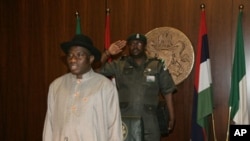Nigeria's acting President Goodluck Jonathan is expected to forward a list of ministerial nominees for senate confirmation by early next week following Wednesday's sacking of the Cabinet.
Acting President Goodluck Jonathan can now appoint his own team of ministers rather than rely on a Cabinet made up largely of his ailing predecessor's appointees. Government sources have revealed that at least half of the sacked ministers may be re-appointed.
Some ministers aligned to ailing President Umaru Yar'Adua have questioned the limits of the acting president's powers, including his capacity to dissolve the Cabinet.
A leading opposition figure and former senator from Lagos state, Anthony Adefuye, says the acting president took the right step in dissolving the cabinet to stem divisions within government and assert his authority.
"There was this rumor that a group of 12 ministers wrote to the [acting] president to say that, when he made the minor reshuffle, he was not fit to make the reshuffle and so forth. Now if you begin to have a divided executive like that then something must be done. It is either you prune it down to the level that you can control or you dissolve it as he has done," he said.
Appointing a new Cabinet should take weeks, which could slow down the business of government in Africa's most populous country. The acting president is in talks with the senate to fast-track approval for his nominees next week.
With elections due in less than one year, the acting president is under pressure to address a few of the more critical challenges facing Nigeria. Senator Adefuye says the government should commit itself to improving power supply and electoral reforms.
"I will expect him to look seriously into the issue of power, into the issue of [electoral] reforms which is in the minds of the people now, and how to ensure that this is done properly. If you can do these two for the people of Nigeria they will forever be grateful," he said.
Mr. Jonathan assumed full presidential powers in early February to fill the vacuum left by the absence of President Umaru Yar'Adua, who had been in the hospital in Saudi Arabia since November receiving treatment for a heart condition.
Mr. Yar'Adua has since returned but remains too frail to govern. The acting president's consolidation of power reinforces the view that Mr. Yar'Adua is unlikely to return.
Nominees for Nigeria's Cabinet Expected Next Week




